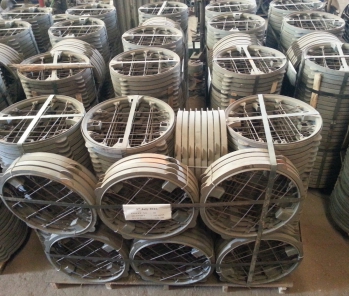EHT - the customized manufacturing
The key business areas of EHT are the customized manufacturing, importing, exporting and trading of iron casting, steel casting, CNC machining, metal art, power coating, OEM-ODM Manufacturing
We have a large supply chain network close to our factory. This gives us a big advantage to bring all kind of subcontracted products to our assembly factory.
EHT Foundry cooperated with local foundries to produce various steel castings for our clients. The materials include low mild carbon steel, medium carbon steel, high carbon steel, low alloy, alloy steels, iron casting, brass casting, bronze casting...
CNC Machining Factories
Precision machining is the process of cutting metal parts to make them fit the end user’s applications and functions. Much of modern machining process are carried out by Computer Numerical Control, CNC, in which computers are used to control the movement and operation of the mills, lathes, and other cutting machines. This method of precision manufacturing, also called CNC machining, plays a vital important role in modern manufacturing industry, especially for some machining parts of high accuracy.
For some of the applications, just or forgings without machining could reach the desired tolerances and surface requirements. However, for most situation, the machining is needed to match the customer's unique specifications and to make sure that the finished metal parts could work properly with other parts. Even for the investment casting parts, which have much better surface and tolerance grade than other metal forming process, still need additional machining process.
To ensure the high quality and precision of the finished machining parts, the computer programs are critical. The Computer Aided Design, which is called CAD for short, and Computer Aided Manufacturing, called CAM, are both used as programs to provide detailed instructions about each step of the precision machining process. Programs like SolidWorks, ProE and UG create extremely detailed 3D models.
Thanks to the advanced CNC machines specializes in manufacturing OEM custom machining parts with machining center, CNC machines and other special tools as per customer's drawings with requirements of strict tolerance and surface roughness. The castings of ferrous and non-ferrous metals are machined at our cnc-machining-factory machining factory, which can help us have a great advantage in controlling the costs and quality.
What can we achieve by CNC machine?
| Facilities | Size Range | Accuracy |
| Vertical CNC Machining Center (VMC) | 1500mm × 1000mm × 800mm | ±0.005 |
| Horizontal CNC Machining Center (VMC) | 1200mm × 800mm × 600mm | ±0.005 |
| CNC Machine | Max turning dia. φ600mm |
Type of Metal and alloy machined at out machining workshop
- Gray Cast Iron
- Ductile Cast Iron
- Carbon Steel from low carbon steel, medium carbon steel and high carbon steel
- Steel Alloys from standard grades to special grades on request.
- Aluminum, Zinc and their alloys
- Brass and Copper
- Stainless Steel, Duplex Stainless Steel
- Wear-resistant Steel, Corrosion-resistant Steel, Heat-resistant Steel.
- Steel Profiles and Aluminium Profiles
- Alloy Forgings
Applications of CNC Machining Parts
Our products are used across industries such as automotive, hydraulics, railway freight cars, heavy duty trucks, logistics equipment, pipe and pump, oil and gas, and agricultural equipment.
Cast brass has higher mechanical properties than bronze, but the price is lower than bronze. Cast brass is often used for general purpose bearing bushes, bushings, gears and other wear-resistant parts and valves and other corrosion-resistant parts. Brass has strong wear resistance. Brass is often used to make valves, water pipes, connecting pipes for internal and external air conditioners, and radiators.


Bronze is a kind of copper-based alloy with main alloying element of Tin. The hardness and strength of bronze increase with an increase in Tin content. The ductility is also reduced with the increase in tin above 5%. When aluminium is also added (4% to 11%), the resulting alloy is termed aluminium bronze, which has a considerably higher corrosion resistance. Bronzes are comparatively costly compared to brasses due to the presence of tin which is an expensive metal.

Ductile iron refers to cast iron in which the graphite is spherical after the molten iron is treated with a spheroidizing agent. That is why the ductile cast iron is also called spheroidal graphite cast iron or nodular cast iron. Inside the ductile cast iron by electron microsope, the shape of spheroidal graphite is approximately spherical, and its interior is radial shape, and it has obvious polarization effect. The spheroidization rate refers to the percentage of the total number of spherical graphite in a certain range to the total number of graphite. The spheroidization rate is an index to measure the spheroidization grade of nodular cast iron, and it is an important standard in ductile cast iron castings.
EHT Foundry, a Viet Nam ductile iron foundry, is producing various ductile iron casting parts for overseas clients in USA, Australia, Germany, Japan.
Production according to standards ASTM A48, A536; DIN 1691, 1693; ISO 185, 1083; EN 1561, 1563; DIN 1691, 1693; AS 1830, 1831; JIS, UNI, NF, BS, UNF, NBN, AS, SS, NS.
The main products include tractor parts, truck bracket parts, hydraulic cradle brackets, plows, brackets, clamps, pulley wheels, flywheel, pipe fittings.


